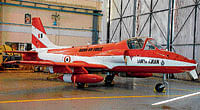The Indian Air Force’s (IAF) ab initio pilot (basic pilot) flying training being in limbo has given rise to a lot of questions over its ability to meet future requirements.

It has also opened up new avenues for some flying training institutes in the country.
The Indira Gandhi Rashtriya Uran Akademi (IGRUA), under the Civil Aviation Ministry, is one such institution that is trying to make the best out of the IAF’s deficiencies.
Sources in the IAF said that IGRUA had made a proposal more than once and that even the IAF had sent its team to evaluate the proposal.
IGURA Director, Air Marshal (retd) V K Verma said: “We made our first proposal in 2009 when the IAF decided to ground its basic trainer HTP-32 Deepak. Subsequently, we made another proposal.”
On both occasions, the IAF had sent a team to study the proposal but “they have not got back to us on the same,” Verma said.
The Parliamentary public accounts committee (PAC) had recently observed that the IAF was falling short of trained pilots by 15-31 per cent every year.
The PAC had made the observation in the backdrop of the Centre initiating the process of finalising the multi-million dollar deal to procure126 medium multi-role combat aircraft. The committee had asked: “Who will fly these aircraft”?
While acknowledging the shortage of training infrastructure, a retired IAF officer said: “Assessing the present situation, even if the trainer aircraft deal is finalised it will not be before 2015 that the induction of the first batch of the aircraft will begin. So, the IAF has to come up with other options to keep the numbers healthy.”
However, with the Kiran fleet of aircraft being the only option, the IAF has reduced the number of basic flying hours for a rookie pilot to 25 hours from the earlier 80 hours. The IAF hopes that by doing so, it can train more people with limited resources — a move that has not gone down well with some.
Air Marshal (retd) B K Pandey told Deccan Herald: “This (reduction in flying hours) short cut will not serve the IAF in the long run, as it would mean that the instructor has only those many hours to assess the various parameters that the IAF looks for in a pilot.” But Pandey, who has also served as the chief of the IAF Training Command here, said the IAF could look to outsourcing the basic training. By doing so, the IAF can even keep the Kiran fleet intact for more years.
Asked if such an option would be open to the IAF, Pandey asserted: “ This is not the first time they are doing this.”
Navy interested in outsourcing
The Indian Navy, whose pilots also begin their ab initio training with the IAF has also been a victim of the crisis, reports DHNS.
According to Verma, the IGRUA had even sent a proposal to the Navy. “Responding to our proposal the Navy, just about two weeks ago, sent its team to study and evaluate the proposal,” he said.